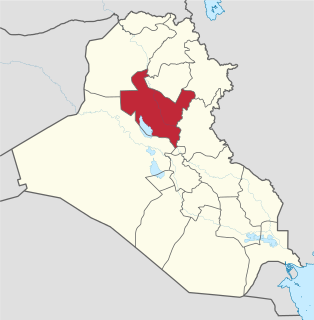The politics of Iraq take place in a framework of a federal parliamentary representative democratic republic. It is a multi-party system whereby the executive power is exercised by the Prime Minister of the Council of Ministers as the head of government, as well as the President of Iraq, and legislative power is vested in the Council of Representatives and the Federation Council.

The Saladin or Salah ad Din Governorate is a governorate in Iraq, north of Baghdad. The governorate has an area of 24,363 square kilometres (9,407 sq mi). The estimated population in 2003 was 1,042,200 people. The capital is Tikrit; the governorate also contains the significantly larger city of Samarra. Before 1976 the governorate was part of Baghdad Governorate.

The electorate of Iraq went to the polls on 15 October 2005 to vote in a referendum on whether or not to ratify the proposed constitution of Iraq. After 10 days of counting votes, the country's electoral commission announced that the constitution had been approved by a wide margin nationwide. A number of critics allege massive irregularities, especially in the crucial province of Ninawa, which was widely expected to provide the third "no" vote.
The first government of Iraq led by Nouri al-Maliki took office on May 20, 2006 following approval by the members of the Iraqi National Assembly. This followed the general election in December 2005. The government succeeded the Iraqi Transitional Government which had continued in office in a caretaker capacity until the new government was formed and confirmed.
Al-Hajaj is a town in Baiji District, Salah ad Din Governorate, Iraq.The town, with an estimated population in 2002 of about 65,000 is the one of the important cities of Salah ad Din Governorate. Most of the people who lives in the town are governmental employees and farmers. It is the home of Salah ad Din governor Ahmed Abdullah al-Jabouri.

Governorate or provincial elections were held in Iraq on 31 January 2009, to replace the local councils in fourteen of the eighteen governorates of Iraq that were elected in the 2005 Iraqi governorate elections. 14,431 candidates, including 3,912 women, contested 440 seats. The candidates came from over 400 parties, 75% of which were newly formed.

A parliamentary election was held in Iraq on 7 March 2010. The election decided the 325 members of the Council of Representatives of Iraq who would elect the Iraqi prime minister and president. The election resulted in a partial victory for the Iraqi National Movement, led by former Interim Prime Minister Ayad Allawi, which won a total of 91 seats, making it the largest alliance in the Council. The State of Law Coalition, led by incumbent Prime Minister Nouri Al-Maliki, was the second largest grouping with 89 seats.
The Al Anbar Governorate election of 2009 was held on 31 January 2009 alongside elections for all other governorates outside Iraqi Kurdistan and Kirkuk.
The Baghdad governorate election of 2009 was held on 31 January 2009 alongside elections for all other governorates outside Iraqi Kurdistan and Kirkuk.

The State of Law Coalition also known as Rule of Law Coalition is an Iraqi political coalition formed for the Iraqi governorate elections, 2009 by the Prime Minister of Iraq at the time, Nouri al-Maliki, of the Islamic Dawa Party.
The Iraqi Scholars and Intellectuals Group is an Iraqi political coalition formed in 2007. It is predominantly formed from the minority Sunni sect and calls for "employing a moderate religious approach to reinforce national unity". In the Iraqi governorate elections, 2009 they took 6% of the vote and 3 seats in Salah ad Din, 3.2% but no seats in Anbar and 1.3% but no seats in Diyala.

The Iraqi Constitutional Party is a political party in Iraq that was founded by Jawad Bulani in June 2005. The party is considered to be moderate and non-sectarian based. The party performed well for a non-sect based party in the governorate elections of 2009, leading to one seat in the Salah ad-Din Governorate and two in the Wassit Governorate. The party is led by Jawad al-Bulani. For the 2010 Iraqi Elections they joined Sheikh Abu Risha's Iraq Unity List. Iraqi Constitutional Party won 3 seats in Wasit but did not win any Salah Ad Din.

National Movement for Development and Reform, more commonly known as Al-Hal or the Solution, is a political party in Iraq. The party is a Sunni-based party.
The Coalition for Iraqi National Unity (CINU) is a political party in Iraq. It is led by Nehru Mohammed Abdul Karim al-Kasanzani.
The Intellectuals and Tribes Alliance for Development or Coalition of Intellectuals and Tribes was an Iraqi political list which stood in the Al Anbar governorate election, 2009. The list was created by the then ruling Iraqi Islamic Party because their popularity had severely decreased. They formed an alliance together with the Coalition of Intellectuals and Tribes together with uniting the Islamic Party, the gathering of Anbar’s Tribal Leaders and Intellectuals, Iraq’s People’s Conference and the Independent Tribal National Gathering. The list won 15.9% of the vote and 6 out of 29 seats.
List of the Martyr al-Mehraab and the Independent Forces,, commonly known as the al-Mehraab Martyr List was a Shi'a Islamist, Iraqi political coalition formed for the Iraqi governorate elections, 2009 by the Islamic Supreme Council of Iraq.

The disputed territories of Northern Iraq are regions defined by article 140 of the Constitution of Iraq as being Arabised during Baath Party rule in Iraq. Most of these regions are inhabited by non-Arabs, most notably by Assyrians, Yazidis, Turkmens/Turkomans, Shabaks and Kurds.

The Uniters for Reform Coalition is a Sunni political coalition in Iraq.

Ahmed Abdullah Abid Khalaf al-Jubouri is an Iraqi politician from Salah ad-Din governorate, and a prominent figure in the Baiji area. He was the Minister of State for Provincial Affairs from 2014 to 2015 and the governor of Salah ad-Din governorate from 2013 to 2014.
Salah ad-Din may refer to :














